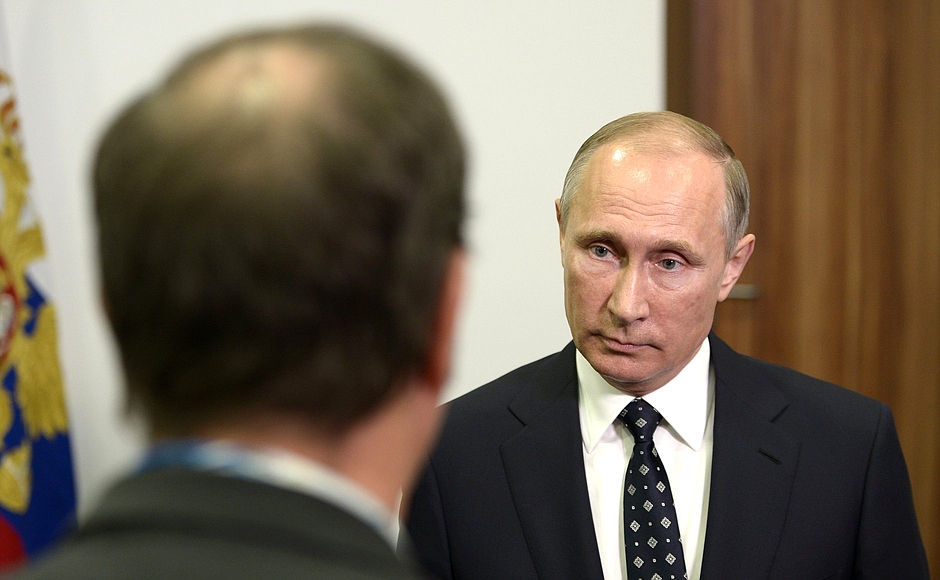Putin puts his case – on why he quit French visit, Aleppo and America
Russian President Vladimir Putin has offered conciliatory words on recent global events that should lift the hearts of those who fear war, in an interview with French news channel TF1.
While some of his comments are couched in diplomatic language, most offer at least a hope that agreement can be reached between Russia and the West over the conflict in Syria – and that it will not be allowed to escalate into a global conflagration.
Much has been made of his decision to abandon a visit to France. While Mr Putin admits it was because of the situation in Syria, he states that the door is open for discussions to take place. [All boldings mine.]
Vladimir Putin: It’s very simple. We had planned to hold an official opening ceremony for the newly built Russian religious and cultural centre in Paris. From the looks of things though, this is not the best moment for official meetings, given the lack of mutual understanding, to put it mildly, that we have over events in Syria, particularly the situation in Aleppo. But we are always open, of course, to any consultations and dialogue on this matter.
You know, it is not that we are renouncing the visit, but simply that we were told that the main reason for this visit, namely, opening the religious and cultural centre, is not appropriate at this moment. But if the main reason for my visit to Paris is not appropriate, we will probably find another opportunity to meet and discuss Syria. We set no limitations concerning this matter and we are open for dialogue.
On the situation in Syria, Mr Putin suggested that much of the terrorist threat in that country follows in from western intervention in Arab countries.
Vladimir Putin:Remember how everyone rushed to support the Arab Spring? Where is that optimism now? How did it all end? Remember what Libya or Iraq looked like before these countries and their organisations were destroyed as states by our Western partners’ forces?
Certainly, these were not examples of democracies as we understand the word today, and there probably was a need and possibility to influence these societies’ organisation, the state organisation, and the nature of these regimes. But whatever the case, these states showed no signs of terrorism. They were not a threat for Paris, for the Cote d’Azur, for Belgium, for Russia, or for the United States.
Now, they are the source of terrorist threats. Our goal is to prevent the same from happening in Syria.
Say what you like about his motives, but this corresponds with what This Blog has been saying about Western – certainly British – involvement in these conflicts. Remember the ‘Cycle of International Stupidity’?
Mr Putin seems to be referring to this behaviour by Western governments, and suggesting that it must end. If so, then This Writer agrees with him. Wouldn’t you?Moving to specifics, Mr Putin discussed the bombing of Aleppo. He said that American forces in Afghanistan once launched an airstrike that hit a hospital, killing members of Doctors Without Borders; and he mentioned Yemen, “where a single strike killed 170 people and injured 500 at a funeral ceremony”.
The sad reality is that wherever military operations take place, innocent people suffer and die. But we cannot allow terrorists to hide between civilians used as a human shield. We cannot allow them to blackmail the entire world when they take hostages, kill, or behead people.
If we want to win the fight against terrorism, we must fight the terrorists and not let them take the lead, not waver and retreat.
But why bomb Aleppo at all when there are no IS forces there?
It seems there are armed forces – but Russia and the US differ on whether they are terrorists.
Mr Putin said the bombings in Aleppo were aimed at Jabhat al-Nusra, an Islamist terrorist organisation sometimes called Al Qaeda in Syria. This organisation aims to set up an Islamist state in Syria and considers Syria, Russia and the US to be enemies. So why are Russia and the US not united against al-Nusra?
Vladimir Putin:It seems to us as though our partners are always repeating the same mistake. They want to use these terrorist organisations’ and radicals’ combat potential to pursue their own political aims, in this case, to combat President Assad and his government, and do not understand that they cannot simply stall them [the rebels] and get them to live by civilised rules after they have tasted victory over someone. [Again, this chimes with the ‘Cycle of International Stupidity’, mentioned above.]
We have reached repeated agreements with the Americans that they will differentiate between Jabhat al-Nusra and its like and the so-called healthy opposition forces, including in Aleppo. They have agreed that this is necessary. What’s more, we have even agreed on concrete deadlines, but nothing is done from one month to the next.
We recently reached a ceasefire agreement, a D-day agreement, as our American friends said. I insisted that they first of all resolve the matter of separating Jabhat al-Nusra and other terrorists from the healthy opposition forces and only then declare the ceasefire.
But the Americans insisted that we first need to declare a ceasefire and then they will take care of separating the terrorists from the non-terrorists. Finally, we agreed to make concessions, agreed to their terms, and on September 12 declared a day of silence and cessation of hostilities. On September 16, American aircraft launched a strike against Syrian army forces that killed 80 people.
At this same moment, immediately after the airstrike, ISIS launched an offensive in this very same place. Our American colleagues told us that this airstrike was made by error. This error cost the lives of 80 people and, also just coincidence, perhaps, ISIS took the offensive immediately afterwards.
At the same time, lower down the ranks, at the operations level, one of the American military service personnel said quite frankly that they spent several days preparing this strike. How could they make an error if they were several days in preparation?
This is how our ceasefire agreement ended up broken. Who broke the agreement? Was it us? No.
Look, everyone is talking about humanitarian access in Aleppo. Everyone is trying to convince us that we should do this. But they do not need to convince us, because we believe it too, we believe that a humanitarian convoy should be sent there. But how can this be accomplished? There is only one road the convoys can take, with militants on one side of the road and the Syrian army on the other side. We know about the provocation, the attack on one of the convoys, and we know for certain that the attack was delivered by a terrorist group.
We have suggested that the militants and the Syrian army both pull away from the road, providing safe transit for the humanitarian convoys.
Everyone agrees, and the idea has even been put on paper, and then nothing happens; none of our partners are doing anything. They either do not want to or cannot pull the militants back, I do not know which.
An exotic proposal has been made – I am going to surprise you and your audience. It has been proposed that our armed units, Russian military personnel, be deployed on the road to ensure transit safety. The Russian military, who are courageous and decisive people, have said they would do it.
But I told them that this could only be done jointly with the US, and ordered them to make the proposal. We have proposed this, and they [the Americans] promptly refused. They do not want to deploy their troops there, but they also do not want to pull these opposition groups back, who are really terrorists. What can we do in this situation?
We must increase mutual trust and admit that these are common threats, and it is only together that we can curtail and eradicate them.
We should be busy not with political rhetoric, but with looking for solutions to the situation, including in Syria. What solutions are there? There is only one solution – to convince all parties to the conflict to take the road of political settlement.
Finally, it seems Mr Putin has found a way to negotiate regime change in Syria without bloodshed. As the removal of President Assad was the original reason for the fighting in Syria – before the terrorists came in and muddied the issue, this is to be praised, isn’t it?
I reached an agreement with President Assad and he has accepted to take the road of adopting a new constitution and holding elections on the basis of this constitution. But we have not succeeded in convincing anyone else to take this road.
If the people do not vote for President Assad, there will be a democratic change of power, but without the help of armed intervention from outside and under strict international control, under UN supervision. I do not understand who could find this proposal unacceptable.
It is a democratic solution to the question of power in the country. We remain optimistic though and hope that we will finish by persuading our colleagues and partners that this is the only possible solution to the problem.
What do you think of that?
Source: News ∙ President ∙ Events ∙ President of Russia
ADVERT
Join the Vox Political Facebook page.
If you have appreciated this article, don’t forget to share it using the buttons at the bottom of this page. Politics is about everybody – so let’s try to get everybody involved!
Vox Political needs your help!
If you want to support this site
(but don’t want to give your money to advertisers)
you can make a one-off donation here:
Buy Vox Political books so we can continue
fighting for the facts.
The Livingstone Presumption is now available
in either print or eBook format here:
Health Warning: Government! is now available
in either print or eBook format here:
The first collection, Strong Words and Hard Times,
is still available in either print or eBook format here:


![[Image: Miki Henderson.]](https://voxpoliticalonline.com/wp-content/uploads/2015/11/cycle-of-hate.png)








How can we tell who’s telling the truth? As far as Nusrat is concerned, in the beginning when the FSA was a name and nothing else, Nusrat was the only gang in action. There was a lot of to-and-fro about arming/training and scandals about both. So….now, ‘moderates’ driven to distraction by the genocide in Aleppo are joining the extremists.
We need the Russians to block the Syrian government forces; in effect, impose a no-fly zone of their own. Maybe, such a visible and audible gesture of faith might make possible an orderly withdrawal of opposition forces which would stop the endless butchery of civilians.
Its easy stop the US and its warlords in there quest to rule the world by making wars
Putin’s position is secure. He faces no opposition to what he says from others within Russia, unlike US, UK. Germany and France who all have elections soon and have opposition voices to deal with.
Nevertheless, Putin’s words seemed conciliatory rather than provocative unlike the Tory “hawks” who seemed to have learned nothing from recent history and seem to think that another war is needed!
Isn’t the UN supposed to be the Forum for discussing these issues? Couldn’t they broker a Conference and get an outcome that would allow humanitarian aid to be provided as a first step?
I suppose that the reluctance of the West to be co-operative with Putin goes back to his invasion of the Crimea. That still rankles NATO who wanted to be banging on Russia’s back door and were well and truly denied that.
We need to get over that event. The Ukrainians appear to have accepted it and it is time the West stopped sulking over it and worked with Putin to get an acceptable outcome in Syria.
It’s naive to think that the US would agree to this kind of deal because they know that Assad would be voted in by a huge majority if his name were included on the ballot. If the US tried to get him removed, it also knows that terrorist attacks will hit the US very quickly.
They want Assad out, and they want a puppet regime to clamp down on Syrian civilians so the US and it’s allies can rob the country of all it’s assets, which is what this war was always about.
They will not countenance any deal whereby Assad continued to rule in a democratic process.
https://www.almasdarnews.com/article/negotiations-surrender-east-aleppo-way/
https://z5h64q92x9.net/proxy_u/ru-en.en/colonelcassad.livejournal.com/3006823.html
So Putin wants elections that only the people who support Assad will be left alive by then sounds like a winning plan for Putin. Letting the west handle all the other people maybe a bit of chaos and other problems for them is just gravy. Putin loves to manipulate these situations and we just let him get away with it again and again this is the definition of madness.